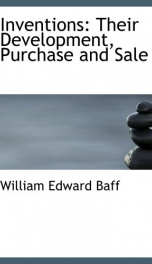inventions their development purchase and sale

INVENTIONS THEIR DEVELOPMENT, PURCHASE AND SALE - 1920 - PREFACE - the from the book is essentially a manual on the market of inventions, and it is proposed to view subject from various angles, proceeding less obvious to the known. In its broader aspect it is a book on business policy and is sent out on its mission of enlightening inventors and others about plans by the aid of which inventions may be profitably exploited. , It is intended, however, not alone for the ordinary layman without experience and worldly wisdom but for busy people in every line desirous of understanding the nature of patent property in inventions. The difficulty has been to confine the book within proper bounds and still leave nothing out which is necessary for passing judgment upon any invention, either from the standpoint of the originator or of the capitalist, investor, or manufacturer interested in working inventions. The problems discussed are the manufacturers problems as well as those of the individual inventor seeking to enlist capital for his new undertaking or to start a new business founded upon a new and useful invention. The most potent word in our business vocabulary today is efiiency. Efficiency is simply a high ratio of results to means. Increased efficiency depends almost wholly on increased knowlehge. The fallacy is now recognized of letting each man go along in v his own way and produce business by using only his own methods. This is a book to show one how to use the efforts of others to the best advantage in order to become a dominating factor. It is in sum and substance primarily written for the average man - for plain folks, not for geniuses. Geniuses do not need guiding. The idea of Wanamaker is, cc All may help, none shall hinder. The aim of this book is to standardize the best way, the best thing, the best thought and see that all inventors know, practice, and use them. In so far as it teaches the paramount necessity of self-help, the suggestions made are of practical value, and in so far as it discloses plans showing how to use the efforts of others to the best advantage, the injunctions given are indispensable. The majority of people have realized that the growth of income is not keeping pace with the growing cost of living. The man who never tried, never helped himself or any one else. The man who never made a mistake, never made anything else. The capitalist is ever sharpen ing his eye, spurring his ambition, and setting his mind to the task of increasing the income side of the ledger. He is keenly on the alert for the knock of opportunity when it comes. And then he is forearmed and sensible enough to investigate, to search into its good features and its bad to examine, analyze, and decide. George Westinghouse first called on Vanderbilt to submit his airbrake. He was turned back with the rebuke, I have no time to waste on new ideas. That remark cost Vanderbilt millions. That policy has had its day. It never pays to refuse to investigate. Prejace , vii The knowledge herein recorded was obtained by busi ness men after the hardest knocks, and they were years and years accumulating the experience that is the readers for a few hours study. Today, to be a success means constant study. Every line of activity mill furnish ideas that one can use in ones business. The more serviceable knowledge one possesses, the better equipped will one be to win out in business. Life is a constant struggle anyway. It is good for people to strive, even desperately if need be, for a certain goal. When attained, it will be appreciated. Try to dispose of a patent in the right way, and it will not be diilicult to succeed... --This text refers to an alternate Paperback edition.
Info about the book
Author:
Series:
Unknown
ISBN:
0521646537
Rating:
3/5 (4)Your rating:
0/5
Languge:
English
Users who have this book
Users who want this book
What readers are saying
What do you think? Write your own comment on this book!
write a commentif you like inventions their development purchase and sale try:
Other books by this author
Do you want to read a book that interests you? It’s EASY!
Create an account and send a request for reading to other users on the Webpage of the book!

